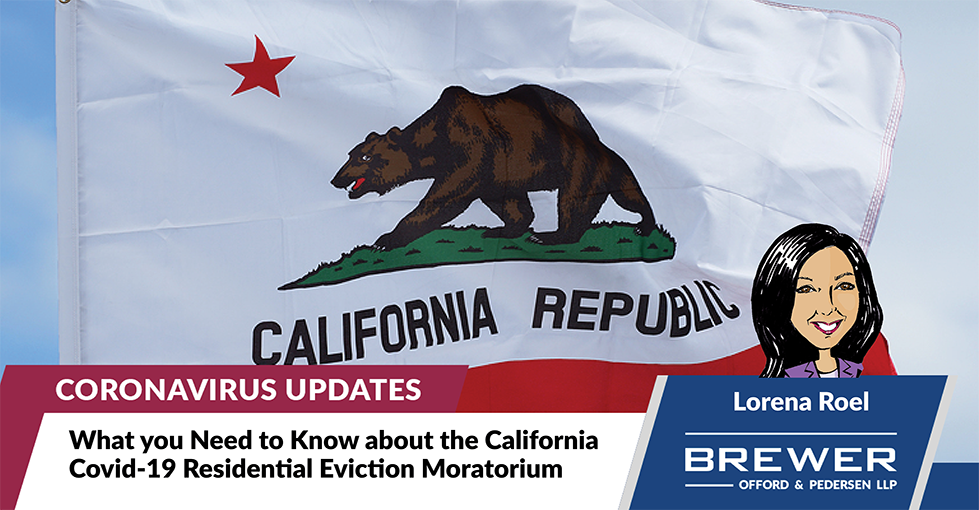In light of the Coronavirus (“Covid-19”) Pandemic that has affected schools, businesses, housing and employment, Governor Newsom executed two Executive Order’s regarding evictions.
The March 16, 2020, Executive Order N-28-20 authorizes local governments to halt residential and commercial evictions based on nonpayment of rent due to loss of income or substantial out of pocket medical expenses associated with the 2020 Covid-19 pandemic.
The March 27, 2020, Executive Order N-37-20 (“State-Moratorium”) applies to all nonpayment of rent due to impacts of the Covid-19 outbreak for residential tenants within the State of California. The State-Moratorium immediately took effect and it expires on May 31, 2020, unless extended by Governor Newsom.
Local governments are permitted to enact their own ordinances so long as there is no conflict with the State-Moratorium. As landlord and tenants must navigate and abide by the State-Moratorium as well as any local moratoriums, below is a highlight of the State-Moratorium for both landlords and tenants.
Landlord’s Duty:
If a tenant does not pay rent during the State-Moratorium period, a landlord must serve the tenant a 3-Day Notice to Pay Rent or Quit, which shall be in compliance with Code of Civil Procedure Section 1161(2). The landlord is not required to, but should also, serve the tenant a copy of State-Moratorium and any local moratoriums.
No-fault evictions are permitted under the State-Moratorium; however, if the tenant is deemed an Affected Tenant, defined below, then a landlord is not permitted to proceed with a no-fault eviction. The State-Moratorium precludes all California Superior Courts from issuing a Writ of Possession against an Affected Tenant and precludes law enforcement from enforcing any Writs until the expiration date of May 31, 2020.
Tenant’s Duty:
A tenant who has lost their income or has incurred substantial out of pocket medical expenses associated with the 2020 Covid-19 pandemic or any local, State, or federal government response to the pandemic (“Affected Tenant”) must notify their landlord in writing of such financial hardship to stop an eviction based upon nonpayment of rent before rent is due or within 7 days from the date that rent is due.
In such notification, the Affected Tenant does not need to provide documented proof of their loss of income, or substantial out of pocket medical expenses for themselves or their immediate family members related to the 2020 Covid-19 pandemic until the Affected Tenant has to pay the back rent owed.
Documented proof can include, but is but is not limited to:
- Termination letter/reduced hours letter from employer citing Covid-19;
- Paycheck stubs from before/after Covid-19 outbreak;
- Bank statements from before/after Covid-19 outbreak; or
- Other objectively verifiable proof of the same.
Though Affected Tenants will not have to pay rent during the State-Moratorium period, they remain liable for the unpaid rent once the State-Moratorium period expires on May 31, 2020. The State-Moratorium is a delayed payment of rent, not a waiver of rent.
Affected Tenants should review any County or City Ordinances regarding evictions as the State-Moratorium does not address 1) late fees or other costs associated with nonpayment of rent and 2) the date in which landlords may collect back rent.
Tenants who have not lost their income or incurred substantial out of pocket medical expenses associated with the 2020 Covid-19 pandemic or any local, State, or federal government response to the pandemic shall pay rent in their usual course.
Local Ordinances:
Various Counties and Cities within the State of California have issued their own Covid-19 Eviction Moratoriums; thus, landlords and tenants should contact their attorney and/or local governments to learn if an eviction moratorium has been adopted and how it applies to them.
Changing landscape:
The State-Moratorium is based upon the current landscape of Covid-19 and depending on its spread and other measures taken by Federal and Local Governments, the State-Moratorium may be extended to a further date, altered or expired by May 31, 2020.
Landlords and tenants should check with their attorney and/or the State’s website in order to ensure that no changes to the State-Moratorium have occurred since the posting of this article.
Brewer Offord & Pedersen LLP will continue to monitor the State’s response and will provide updates when appropriate.
